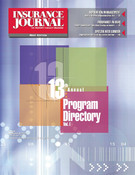A special report released by A.M. Best Co. cites “vastly improved operating earnings” recorded in 2003 and a considerable boost from unrealized capital gains, as fueling a 21.8 percent increase in the U.S. property/casualty industry’s overall surplus.
Best said: “These events have propelled the industry’s surplus to record levels, and continued operating improvements have led to profitable midterm results in 2004. In A.M. Best’s view, and despite the collective risks that expose individual companies to potential shortfalls, the property/casualty industry in total maintains capitalization that adequately supports its asset, credit and underwriting risks, in aggregate.”
The report also notes that “not surprisingly, as of year-end 2003, the industry experienced an increase in risk-adjusted capitalization when compared with the prior year. Moreover, nearly $44 billion of contributed capital during the years 2001-2003 has served various roles, from fuel for growth engines to life preservers, for insurers managing the challenges of the underwriting cycle.”
The rating agency said the report’s findings were derived by “assessing individual company, risk-adjusted capitalization measures from A.M. Best’s proprietary Best Capital Adequacy Ratio (BCAR) analysis. This view of capitalization is based on current rating levels and an analysis that utilizes risk-based capital measures incorporating property/casualty insurers’ most severe financial risks, led by potential catastrophe losses, loss-reserve deficiencies, reinsurance recoverable risks and declines in stock-market values. Also incorporated in the study is the economic valuation of soft capital and A.M. Best’s view on the quality of capitalization.”
Assuming the accuracy of Best’s findings, the report is strong evidence that the industry has finally taken some concrete steps to manage the cycle, which has plagued it for so long. Best said, “several years of price increases combined with more rigid underwriting standards are fundamental drivers of the industry’s improved operating performance and subsequent capital position.”
The increase comes after 2001, which Best called the industry’s “worst year ever,” with an underwriting loss of $53.9 billion. It said that since then the industry has demonstrated “a marked improvement for the second consecutive year in 2003 underwriting results, as total industry underwriting losses were cut to just less than $5 billion. The improved underwriting fundamentals are even more evident when taking into account the impact that the prolonged, suppressed interest-rate environment has had on fixed-income investments, which account for the majority of insurers’ investment portfolios. To complement the underwriting strides that the industry has made, total return measures were propelled in 2003 by the rising stock market.”
Best said it “views the industry as adequately capitalized for its current asset, credit and underwriting risks, although this adequacy will vary from company to company.” It added, however, “despite this view, rating downgrades continue to outpace upgrades for the fourth consecutive year, as not every carrier capitalized on the recent hard market. The amount of rating downgrades since 2001 is attributed to the overall decline in capitalization in light of increasing underwriting risks and earnings volatility. However, downgrade activity has subsided in 2004, as Best maintains stable outlooks on the reinsurance and personal lines sectors, while the commercial lines segment’s outlook remains negative.”
Was this article valuable?
Here are more articles you may enjoy.


 Q4 Global Commercial Insurance Rates Drop 4%, in 6th Quarterly Decline: Marsh
Q4 Global Commercial Insurance Rates Drop 4%, in 6th Quarterly Decline: Marsh  Florida’s Commercial Clearinghouse Bill Stirring Up Concerns for Brokers, Regulators
Florida’s Commercial Clearinghouse Bill Stirring Up Concerns for Brokers, Regulators  Uber Jury Awards $8.5 Million Damages in Sexual Assault Case
Uber Jury Awards $8.5 Million Damages in Sexual Assault Case  Allstate CEO Wilson Takes on Affordability Issue During Earnings Call
Allstate CEO Wilson Takes on Affordability Issue During Earnings Call 


